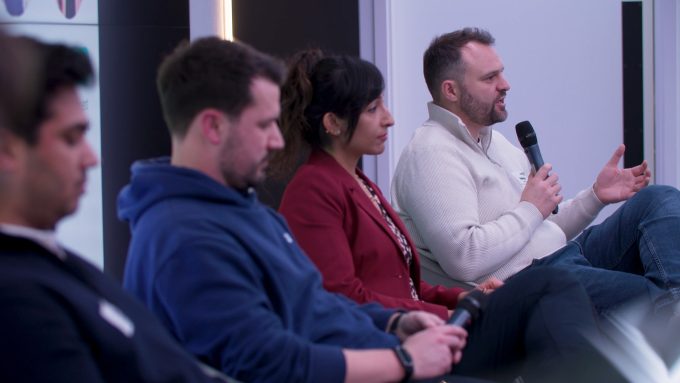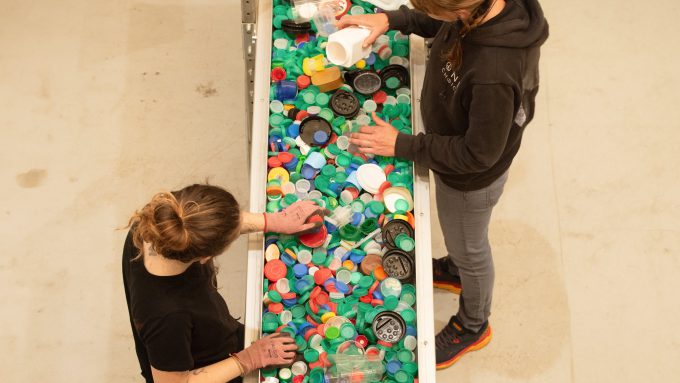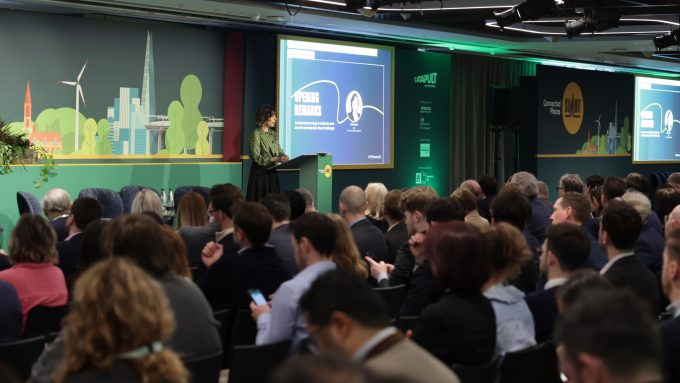
West Midlands showcases clean tech innovators in rail and automotive

Innovators with cutting edge technologies looking to make the next step in their journeys towards commercial success are often individually excellent. But their offer could become even stronger by working closely with peers to discuss shared challenges, and listening closely to the advice of stakeholders working closely with major clients.
Two gatherings this spring of rail and automotive specialists involved in the Clean Futures Accelerator – convened by Connected Places Catapult – provided the forum for shared discussions.

One event at the Very Light Rail National Innovation Centre in Dudley at the end of April brought together companies developing railway technology with several tier one suppliers, who gave their thoughts on the qualities that buyers may look for in the founders of small companies.
“I look for people who have passion, enthusiasm about their product, and knowledge of what they're trying to bring to the sector,” remarked Simon Higgens of rail engineering firm Story Contracting. “I'm also looking for those with thick skin; because it's hard work bringing a great idea into the industry.”
He added that innovators who are prepared to “knock on people's doors, attend events to raise their game and work tirelessly” are most likely to reap reward. “You have to keep going, never give up, and be brave and be bold to get your product to where it deserves.”
Simon also said that everyone involved in innovation “should not shy away” from products that may deliver “incremental change” towards a target such as carbon net zero, because “the golden bullet may never arrive”. Innovations, he added, are not always revolutionary, but sometimes evolutionary.
He also urged the rail sector to look to “people on the periphery” with good ideas, adding that the work of the Clean Futures Accelerator in recent months has helped to shine a light on organisations that may not otherwise have come to the fore.
Focus on the simple things
Also on the panel was Andy Lawrence, the head of business development at TVS Supply Chain Solutions, a specialist supply chain and logistics provider in the UK rail sector. He cautioned that the rail sector can get “bogged down thinking that innovation has to be about new technology” and urged a focus instead on “the simple things that can be changed. Sometimes you don't have to spend a fortune in research and development; innovation could be a simplifying and streamlining of processes.”
Andy explained that his company works closely with Network Rail, and is fortunate to have an opportunity to work closely with the client in terms of the suppliers they work with, and the products they buy to see whether innovative new ideas could be brought to the table.
“Being a partner with all of you here,” he told the audience in Dudley, “gives us the opportunity to be a shop window for UK rail and showcase innovation that can be of future benefit across the entire rail spectrum.”
Panel chair Martin Little of the Black Country Innovative Manufacturing Organisation (BCIMO) asked the West Midlands Combined Authority’s innovation board member Sarah Windrum what makes for good innovation. “For me, there's two different ways of looking at innovation,” she replied. “There's the new products, and then there's process driven innovation – making things more efficient or sustainable. Both are really important. But above all, innovation is only good if you are using it, rather than it just being in a laboratory somewhere, or if it represents the art of the possible.”

Sarah added that the Clean Futures Accelerator has proved to be “a brilliant opportunity to learn about some of the new technologies being developed, and a network to meet other businesses.
“The programme has been an exemplar in building relationships across clean transport,” she said.
Neil Fulton, the chief executive of the BCIMO, said for innovations to thrive there not only has to be a good idea, but collaboration too. “Working with other disparate organisations to help develop your product, and then to communicate the work you're doing, is really key. You also need an ability to bring people with you, and get the right people on board; making sure that you're going to events, you are presenting whenever you can, and sharing your ideas at every opportunity.”
Connected Places Catapult’s Clean Futures Accelerator Programme Manager, Hannah Fortune said that the programme aims to solve problems and bring something new to the region. “What we have tried to do differently with Clean Futures is to focus on the commercial aspect to the programme, and provide support with two industry boards, to see what business opportunities are available for SMEs and how we might be able to connect them with investors,” she said,
The event also featured a showcase of companies on the cohort who demonstrated their technologies at the Very Light Rail National Innovation Centre. Read more about the cohort and its new ideas.
Coventry shines a light on bright sparks in automotive
A second showcase event highlighting green transport technology through the Clean Futures Accelerator programme took place at Coventry University’s Institute for Advanced Manufacturing and Engineering.
Ideas and prototypes on show included a new way of charging electric motorbikes used by food service outlets, and an amphibious tour bus that can go on road and in the water.
Seahorse Amphibious Vehicles currently has one bus in Cape Town, South Africa, and another in Liverpool, with plans to deliver vehicles to Helsinki, Singapore and Glasgow.
Co-founder Ed Lumley said: “We started off using diesel but as times have moved on, we’ve seen a real gap in the market and a need to use clean energy. We're now developing an electric vehicle and we've been using second-life components, so from things like crashed electric vehicles we've been taking the batteries and trying to get them to communicate with our own systems as well.

“We heard about Clean Futures about eight months ago and this being the first time this grant was launching. We were awarded the grant and it's been fantastic. It's given us credibility in the market which has allowed us to sell these electric amphibious vehicles – at the start of the project we had no sales, but by the end of the project we had sales for five electric vehicles.”Seahorse Amphibious Vehicles, Co-founder Ed Lumley
Another firm to have benefitted from the Accelerator is battery pack manufacturer Aceon which boasts among its work a collaboration with the Red Cross to help humanitarian efforts in Ukraine.
James Willetts, technical director at Aceon, said: “We have a Red Cross programme where we're looking at putting these mobile back-up battery packs into Ukraine for running emergency equipment such as insulin fridges or helping if there’s a blackout and they need power.
“The support from Coventry University has been two-fold as it has helped some of our projects with 3D design and also testing.”
Support for 13 of the businesses on the Clean Futures Accelerator programme is provided by Coventry University’s Research Centre for Manufacturing and Materials.
Professor Marcos Kauffman, Director of the Research Centre for Manufacturing and Materials and Institute for Advanced Manufacturing and Engineering, said: “The Clean Futures project is aimed at helping the West Midlands Combined Authority in achieving its 2041 net zero strategy. The Combined Authority created a road map to 2041 and identified certain areas of critical technologies that will be necessary for us to achieve net zero in our region; industrial emissions, transport emissions and housing emissions.
“In this programme we are particularly tackling transport emissions and these 13 SMEs are working in a range of technologies, mostly related to internal combustion transition to electric vehicles. We have battery cell chemistry, battery cell componentry, companies working on clean sustainable fuels, clean sustainable materials and material recovery from recycling of old vehicles.
“It’s very exciting to have everything come together and the SMEs having their technologies here so we can see the result of the work that we've done in the first six months of this project with the first cohort. It is also exciting to see the cross-pollination of the local companies that are all working on complementary technologies that could come together to really make a difference in our region.”Professor Marcos Kauffman, Director of the Research Centre for Manufacturing and Materials and Institute for Advanced Manufacturing and Engineering
Apply now for the next Clean Futures Accelerator, closing 9 June.
Clean Futures is being led by Connected Places Catapult in collaboration with the Black Country Innovative Manufacturing Organisation, Coventry University and CU Services Limited. It is part of the wider West Midlands Innovation Accelerator, which is designed to bolster the region’s innovation and R&D capability and spark commercial growth and investment. The West Midlands Innovation Accelerator is delivered in partnership with the Department for Science, Innovation and Technology, Innovate UK and the West Midlands Combined Authority.






